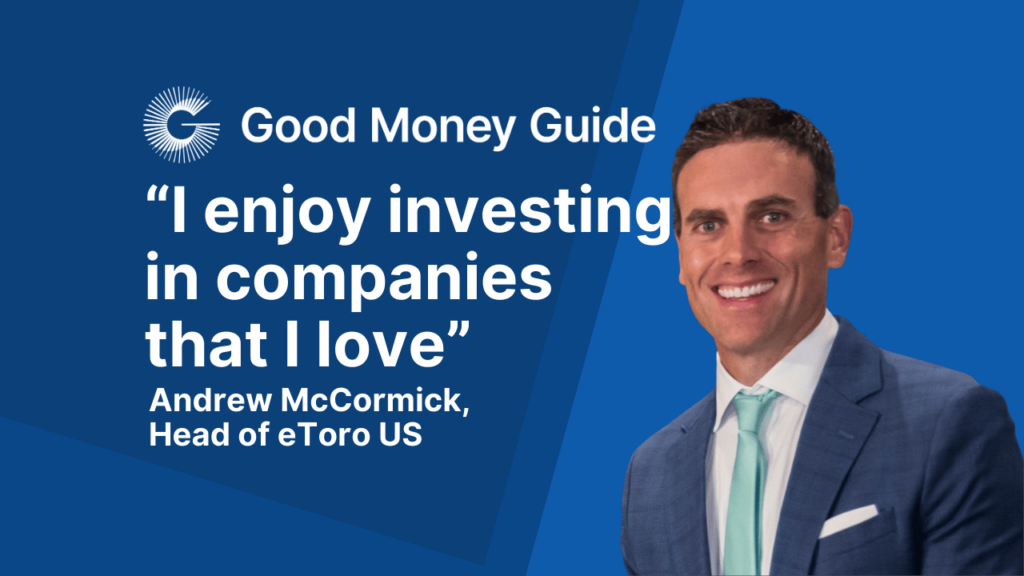I’m not saying that Americans are better than the English, but there is one thing they are definitely better at than the Brits. And that’s getting stuck in.
Let me give you an example. When I worked on the NYMEX crude oil trading floor in New York, if anyone ever stood up and gave a speech or had an important announcement to make, the brokers and dealers would whoop and cheer.
But, when I worked on the IPE Brent oil trading floor in London, whenever anyone had to say something important, it would be met with jeers and boos.
It’s just the different cultures.
This will be important because I think it’s going to be a good indication of how well eToro is going to do in the US.
In the UK, where eToro has been in existence since 2007, you never really hear anything negative about them. People love them. They love the copy trading, they love the easy-to-use platform, they love the crypto, and they love talking their own book. This is odd, because when it comes to money in the UK, people are usually very negative.
The founder, Yoni Assia, who I interviewed in 2018, has always had the community of investors at heart, and it’s this community that gives eToro it’s pulse.
So what’s going to happen when you take something that people love to talk about from a country that hates to talk about money to a country where everyone loves to talk about the all-mighty Dollar?
I suspect it’ll be that American investors get stuck right in…
To find out a little bit more about eToro’s plans and what it can offer investors in the US they can’t get anywhere else, I spoke to Andrew McCormick, the head of eToro US.
What does eToro offer US investors that other platforms don’t?
eToro offers an easy-to-use platform where US investors can learn about markets, engage with a global community, and invest in multiple asset classes including stocks, ETFs, options, cryptoassets, and even earn interest on cash. Our social networking and trading features really set us apart. Whether it is for recipes, vacation ideas, or patenting tips, we all frequently turn to social media for inspiration.
eToro has built a platform where new and experienced investors alike can leverage the information and insights available on our platform to help them on their own investment journeys. We have found in prior surveys that over 80% of investors turn to social networks for inspiration and guidance. We are proud to offer a regulated and transparent platform where investors can learn, share, and support each other along the way.
In addition, we have also built the eToro Academy to help offer more formal opportunities for investors to learn about markets and we even sometimes even give users free money for completing courses and quizzes in the Academy!
What are US investors most interested in buying?
Despite a bumpy start to the year, we are still seeing US retail investors focused on growth sector stocks such as technology and companies such as NVIDIA, Tesla, AMD, and Amazon continue to be some of the favorites.
In addition, whether it is Bitcoin reserve policy discussion or meme coins, we are certainly seeing an uptick in discussion about cryptoassets in recent months. In turn, we are seeing an increasing interest from investors in this rapidly evolving asset class. The latest Retail Investor Beat survey of 1,000 American investors found that 66% planned to increase their holdings in cryptoassets in 2025.
As countries, states, and companies announce that they are exploring the idea of starting to buy and hold cryptoassets, it is natural for investors to consider doing the very same.
What’s been the hardest part of launching eToro in America?
In the United States we have a very complex regulatory environment compared to other regions. The United States often leads on technological creativity but we have fallen behind on regulatory innovation. eToro US offers a platform where users can learn about markets and choose to invest in traditional products like stocks or also more novel assets like Bitcoin.
However, operating such a platform subjects us to about 100 different regulatory regimes within the country. A 100! This includes national regulators such as the SEC and FINRA, but also securities regulators in each state, as well as state money transmitter regulators.
Also, much of the regulatory news regarding cryptoassets you have read about in recent years relates to laws established in the 1930s and case law going back to the 1940s. That is not the ideal legal and regulatory framework for innovative financial products in 2025.
What do you personally invest in?
I break it down into three different buckets. Historically, the largest chunk of my investments have been in S&P 500 ETFs or mutual funds or ETFs focused on a specific industry like technology.
There is a lot of research out there showing that it is hard to beat the S&P 500 over long periods of time even if it is not always the most exciting of investments to make.
Secondly, I enjoy investing in companies that I love. It might not always end up being the best mathematical investment based on the end results, but I feel more connected to my favorite brands and enjoy telling my kids that we are owners – really tiny owners – of some of their favorite companies.
I try to regularly make small investments in our family’s favorite brands such as Spotify, Netflix, Cava, Chipotle, Target, Disney, or other consumer staples. It might end up being only $10 a month – less than the price of a burrito these days – but over time the hope is that those small bite-sized (pun intended) investments pay off and we learn about the company along the way.
Of course, this doesn’t always work out as some of my favorite brands may be considered duds from an investor perspective.
Finally, I am a big believer in Bitcoin as a technology and transformative asset class. I think there is a massive wave of institutional investors – in the form of countries, states, companies, and advisors – coming into this asset class very soon. It is a wonderful form of currency with a limited supply that protects its value from reckless government printing or spending.
Given its limited supply, coupled with the potential influx of institutional buy-and-hold investors, I’ve invested more in this asset class during the past year. If I used a financial advisor, I am confident they would say I am over indexed in Bitcoin and Bitcoin ETFs but I am a believer and enjoy the adventure.
Can you remember your first investment?
I certainly remember the first investment I wanted to make as a kid. As a kid growing up in the ‘90s, I was obsessed with Jordans and Nikes. I once wanted to spend $100 of birthday money to buy Nike stock.
I looked up the price in the newspaper – an actual printed newspaper – but that is as far as I could get as my parents weren’t familiar with investing. I’m sure it would have cost me $20 to buy the shares, but a $100 Nike investment in the ‘90s sure could buy me a lot of new shoes today! I did eventually make my first stock investment around 2008 in one of my favorite clothing companies.
It was for probably $250 and I am sure I spent a bunch on commissions and I eventually sold it for a loss and the stock is now worth way less than a penny per share today.
What about your best and worst?
Best investment: Investing time in my family! The second best investment I’ve made – and again, it is far from the most exciting – is just putting a big chunk of my investments in an S&P 500 fund. Time in the markets typically works well over long periods of time and that has been the case for those investments.
I did well with Tesla in recent months as I am a big believer in their robotics future and Bitcoin has certainly had a positive few years.
Worst investment: Thankfully, no big horror stories here. I’ve had one investment – in the stock of my local gym that I love – go to zero but thankfully the investment was less than a monthly membership. The investments that hurt my heart the most in retrospect are selling some Bitcoin when it was bouncing around $3,000 and not buying more at various stages.
I once sold some Bitcoin at $3,000 and we excitedly went on a family vacation with those earnings and had a great time. It was a wonderful trip, but now with Bitcoin around $100,000, whew, that was a very expensive vacation in retrospect!
Can you recommend a book, or website that can help American investors make more of their money?
I used to read books all the time, but with work and four kids at home, I’m not in my reading era these days. I wish I could drop some wise book recommendations, but instead I’ll share my go to source for investing news is Yahoo! Finance.
I have it open on my computer all day during work and I use it as a go-to resource for financial, social, and political news, market prices, and even online discussions.
Andrew McCormick is head of eToro US

Richard is the founder of the Good Money Guide (formerly Good Broker Guide), one of the original investment comparison sites established in 2015. With a career spanning two decades as a broker, he brings extensive expertise and knowledge to the financial landscape.
Having worked as a broker at Investors Intelligence and a multi-asset derivatives broker at MF Global (Man Financial), Richard has acquired substantial experience in the industry. His career began as a private client stockbroker at Walker Crips and Phillip Securities (now King and Shaxson), following internships on the NYMEX oil trading floor in New York and London IPE in 2001 and 2000.
Richard’s contributions and expertise have been recognized by respected publications such as The Sunday Times, BusinessInsider, Yahoo Finance, BusinessNews.org.uk, Master Investor, Wealth Briefing, iNews, and The FT, among many others.
Under Richard’s leadership, the Good Money Guide has evolved into a valuable destination for comprehensive information and expert guidance, specialising in trading, investment, and currency exchange. His commitment to delivering high-quality insights has solidified the Good Money Guide’s standing as a well-respected resource for both customers and industry colleagues.
To contact Richard, please ask a question in our financial discussion forum.



